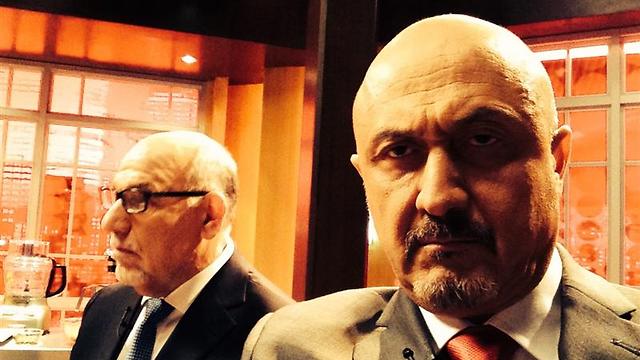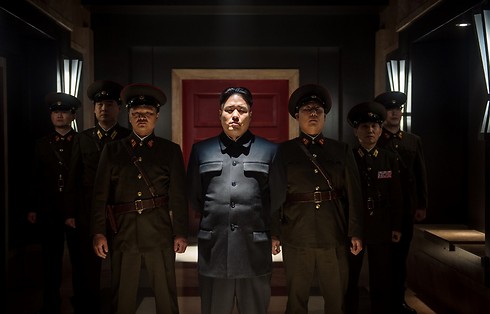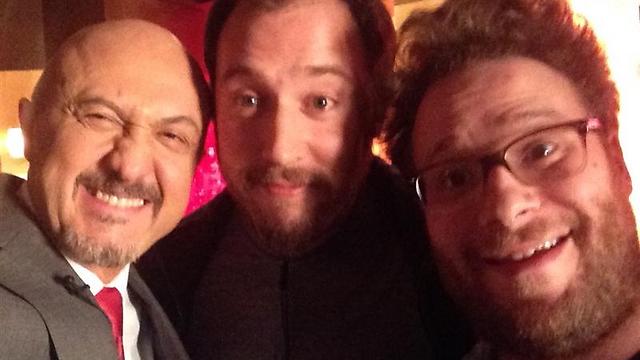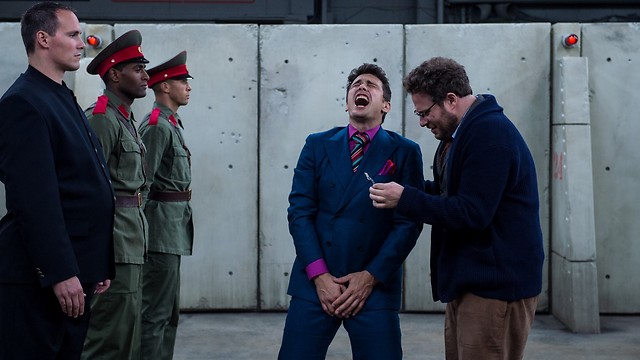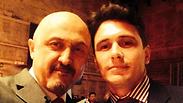
Israeli-Palestinian conflict scene cut from 'The Interview'
Alan Blumenfeld and David Diaan talk to Ynet about movie that sparked international controversy, in which they play Israel's prime minister and Palestinian president who can agree on one thing - they both love falafel!
It's no secret that North Korea's Supreme Leader Kim Jong-un is at the heart of comedy movie "The Interview," but you might be surprised to learn that directors Evan Goldberg and Seth Rogen also included the Israeli-Palestinian conflict in their movie.
For those who still haven't heard of the movie, the plot revolves around two Americans, TV host Dave Skylark (James Franco) and his producer Aaron Rapoport (Seth Rogen), who manage to score an exclusive interview in North Korea with the reclusive dictator, and are recruited by the CIA to assassinate him. The real Kim Jong-un was infuriated by the movie, which parodies him, vowing "stern" and "merciless" retaliation if the film were released.
Somehow, the prime minister of Israel and the Palestinian president find themselves involved in this mess - in a scene filmed but later cut from the movie.
But don't worry - no one is trying to assassinate Benjamin Netanyahu and Mahmoud Abbas. Unlike Kim Jong-un's character (played by Randall Park), who is based on the real Supreme Leader of North Korea, the Israeli and Palestinian leaders are not mentioned by name in the original script.
The discarded scene shows the Israeli premier and the Palestinian president as guests in "Skylark Tonight," the celebrity tabloid show hosted by Franco's character, with the two leaders arguing about the peace process. Despite all of the arguments, the popular host manages to bridge the gaps using... falafel.
The Israeli prime minister is played by American actor Alan Blumenfeld, 62, while the Palestinian president is played by American-Iranian actor David Diaan, 52.
In his attempt to solve the Israeli-Palestinian conflict live on air, Skylark serves them a falafel sandwich made by celebrity chef Guy Fieri (who appears as himself). Once they both agree that the falafel is great, Skylark draws the conclusion that the two leaders CAN agree.
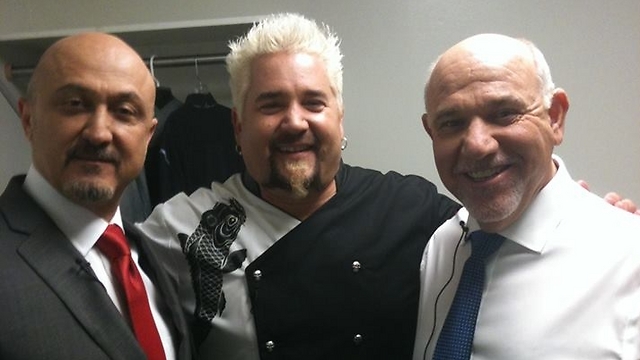
"Our scene is really an add-on to the film. I think it is an idea to bring humor to a volatile situation and to propose a funny solution," Blumenfeld says. "The Israeli prime minister and the Palestinian president can agree that they love falafel and that mutual enjoyment could lead to peace. Food brings contentment... a good message, I think."
Sadly, the scene in question was left on the editing room floor. Blumenfeld received the news on Wednesday with a thank you note and "an excellent bottle of wine" from Rogen.
"Before the movie was such a big deal, I wouldn’t care. Now I do. But, I know my scene is in the DVD extras," Diaan says.
Blumenfeld adds: "Well, sure I was disappointed that the scene was cut, but it made sense. The scene was not an integral part of the plot."
This scene could obviously not happen in reality, and the characters are not based on real-life politicians.
"They are not at all based on anyone living or real," Blumenfeld says. "Just representatives of a situation that needs a creative solution. And a hope that finding a funny idea can diffuse some of the tension. No political statement," he clarifies.
Diaan, on his part, jokes: "I hope my scene is still in the movie after all this political hoopla. Who knows maybe the Palestinians will threaten next!"
Diaan says he did not seek inspiration from Palestinian leader Abbas, "I was just being myself and I am much more handsome than Abbas."
Blumenfeld also attests he did not need to research Netanyahu or his predecessors for the role, "I did not base my performance on any living or dead Israeli. I used the script and followed that as my lead. This is not a bio pic, just a comedy."
Sony's announcement the movie would have a limited released was met with cries of joy from its creators.
"We did it! Thank you all! Enjoy the movie!" Park wrote on his Twitter page.
"The people have spoken! Freedom has prevailed! Sony didn't give up! The Interview will be shown at theaters willing to play it on Xmas day!" Rogen wrote.
Producer Evan Goldberg also joined the chorus of happiness: "Thanks to everyone who didn't give up on our movie! @Sethrogen & I are humbled & overwhelmed by your support. Hope you enjoy the film!"
Blumenfeld and Diaan were naturally also happy to hear the movie will be released.
"I think it is a far-reaching problem to allow blackmail and ransom to dictate content or art. Cancelling the film showing was a bad idea and a bad precedent, which has been reversed, thankfully," Blumenfeld says.
Diaan believes this was an issue that was bigger than Hollywood. "To me this goes beyond a movie and the movie industry. This is a security matter that has now come to surface and has to be dealt with on a broad level," he says.
As if the uproar over "The Interview" was not enough, Diaan also stars as a Pakistani general in HBO comedy "The Brink," that also deals with diplomatic incidents concerning the United States and the Middle East in the midst of a crisis that could lead to a third world war. The show, directed by Jay Roach (who also directed "Austin Powers"), also stars Tim Robbins, Jack Black, Aasif Mandvi and Israelis Niko Koshet and Ido Mor.
Can this recent trend of political comedies mocking the geopolitical climate cause more controversy?
"The beauty of comedy is that you can play with fire. But of course you have to know how to do it in order not to get burned. The world needs comedy and believe me sometimes the actions of our politicians is more comedic and childish than any comedy out there," Diaan says.
Blumenfeld concurs: "Comedy and art in general should always provoke and push the envelope to both entertain and to create conversation."
The precedent set by "The Interview" could encourage leaders of other hostile countries to try and prevent the creation and distribution of movies that do not portray them in the best of lights.
It was only two years ago that then-Iranian president Mahmoud Ahmadinejad and his advisers tried to stop the release of Oscar-winning thriller "Argo," that centers on Tehran in the days of the 1979 Islamic Revolution and does not portray the Iranian public in a positive light. After trying to deter local filmmakers with arrests and exiles, the Iranian leadership and other such type of regimes might now try to fight foreign creators with threats and terror attacks.
"The Iranians politicians (and) mullahs are very good at acting pure and innocent. If they do such a thing, they will do it behind the scenes and never admit to it," according to Diaan, who came to the US as a teenager to study and was forced to stay there in exile after the 1979 revolution in his country.
Twenty-four years later, Diaan returned to Iran for the first time to film a documentary titled "Iran Is My Home," which features the cultural changes he encountered in the streets of Tehran.
He is also an active member of the exiled Iranians community in the US, and participates in a variety of film productions dealing with their reality.
"The Iranian regime rules by standards that are ancient and prohibitive," Diaan says, trying to explain the regime's aversion to American cinema. "Of course they fear modernity and freedom of speech and are paranoid about being criticized. Censorship is common in such environments; hence they boycott films and opinions that threaten their existence."
Diaan himself got to play Iranian prime minister Mohammad Mossadegh (in the 2011 short film "Mossadegh") who was ousted by the CIA and the MI5.
Diaan said that movie can hardly be compared to "The Interview."
"At the time of Mossadegh, these were all hush hush agenda. No one in Iran would imagine a CIA presence in Iran. Today things are out in the open and much more obvious. Also whereas Mossadegh was a national Iranian Hero, Kim Jong-un appears to be a national maniac!"
And what about Israel? Diaan, it turns out, visited Israel not too long ago for the filming of the movie "Baba Joon" from director Yuval Delshad. Navid Negahban (Abu Nazir from "Homeland") stars in the Israeli film in the Persian language which will hit screens in 2015.
"I love Israel," Diaan says. "I stayed at the beach for two months. My family visited me. The cast and crew of Baba Joon were wonderful and kind. It was a great experience. I can’t wait for the movie to come out. Thank god Baba Joon has nothing to do with North Korea."










